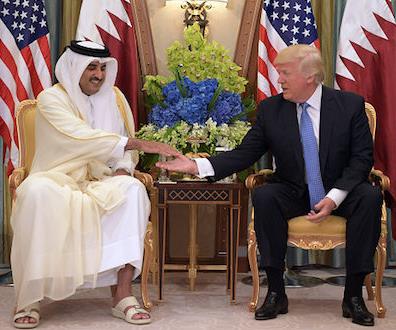 Following the Pentagon’s June 14, 2017 statement on a military deal regarding a squadron of 35 F-15 jets delivery to Doha, expectations are ramping up for a cluster of tranquility in the Gulf diplomatic mess which could have paved the way for a military confrontation between four countries against Qatar, as they blame Doha for funding and supporting terrorism in the region.
Following the Pentagon’s June 14, 2017 statement on a military deal regarding a squadron of 35 F-15 jets delivery to Doha, expectations are ramping up for a cluster of tranquility in the Gulf diplomatic mess which could have paved the way for a military confrontation between four countries against Qatar, as they blame Doha for funding and supporting terrorism in the region.
The total amount of the deal is not just US$ 12 billion – the price of the announced 36 jets, as additional 36 jets are to be agreed upon later on – making the deal worth more than US$24 billion.
Jets manufacturer Boeing in a statement on its website said: “This is a very important deal for preserving the production of this sort of planes and creating 60,000 job opportunities in 42 American states.” This means that the money acquired through the Qatar deal helps Americans proceed with their business as the production of the jets was at risk due to lack of demand.
The American president has fuelled the threats against Doha by his strongly-worded warning, where he accused Qatar of being a “funder of terrorism… at a very high level,” calling on Qatari government to “stop immediately supporting terrorism”.
Shortly after the deal was closed, the President Trump’s tweets of a few days earlier in which he said that “Qatar has a history of backing terrorism at a very high level, and must be punished” as well as other in which he insisted that “the isolation of Qatar is the beginning of the end for terrorism”, the tweets have completely disappeared from his Twitter account. Moreover, they were succeeded by other statements praising Qatar as a strong US ally, while stressing that the warplanes deal represents a big step towards ‘consolidating’ strategic and security cooperation between the two countries.
Earlier, US president Trump has expressed Washington’s support for Bahraini, Egyptian, Saudi and Emirati anti-Qatar coalition. This has been made clear during recent White House press conference when he announced that along with “Secretary of State Rex Tillerson, our great generals, and military people”, he decided [that] “the time has come to call on Qatar to end its funding”.
The already complex Gulf crisis was further complicated with the subsequent US fighter jets deal with Qatar and the ensuing joint US-Qatari military exercise that have together sent counter-signals to the four-state alliance, effectively contradicting the US Secretary of State’s conciliatory request delivered in a calming tone to the countries directly involved in the rift.
Though the American Secretary of State is preparing a meeting for the Saudi, Qatari and Emirati officials in Washington, Trump seemed angry with the Qatari officials, mainly the country’s Emir Sheikh Tamim, for turning down an invitation to visit the US, under suspicion that the invitation was a trap similar to the one his grandfather fell into, when while on a visit in Egypt and the UAE, his son Hamad carried a coup that dethroned him.
Was then the American Qatari multi-billion jet deal a placebo or a relaxant to the belligerency against Doha from its neighbors?
As the deal is still to be considered by the Americans and their officers since the jets won’t be instantly handed over to Qatar, the deal is said to be absorption of the American anger as the US has about 10,000 troops in Al Udaid base in Doha, which would act as a springboard spearheading any coup schemata.
With the UAE ambassador to Washington statements that there would be no military intervention in Doha, this has double meaning from diplomatic and political viewpoints as history has proved it a long time ago. When diplomats speak about something, the opposite takes place.
It was evident from the outset of this crisis that it would get increasingly serious amidst expectations for further escalation, especially after a number of GCC officials started paying visits to the UK and Russia. The latter being under radar to gauge whether Russia would side with the four-states’ alliance or Doha, due to the huge economic benefits it would gain through yet unannounced agreements with Qatar.
It is speculated that Russia is considering taking control over the world natural gas industry. Once Russia wins over Qatar, as it has already done with Iran, more than 80 per cent of world gas production would be at its disposal. Was this recent rapprochement between Moscow and Doha the real reason for the uproar between Doha and its Arab brethren rather than ‘funding and supporting terrorism’? Will this crisis set the Middle East region partially or wholly ablaze?
The Qataris are now playing politics, as far as the F-15 deal is concerned. The deal has helped the American administration secure an additional US$ 12 billion injection into its military industry. It remains to be seen whether it will help Doha to disentangle itself from the brotherly ambush.
These are all chess pieces moved around adeptly by the superpowers, at the suitable time, especially after the 55 Arab and Islamic states alliance meet up in Riyadh Summit last month. As to who will make the check mate move to end the game is anybody’s guess at this point.
Article published in Geostrategic Media: http://geostrategicmedia.com/2017/06/the-future-of-the-gcc-ignited-brouhaha-in-the-region-between-the-us-and-russia/
Photo credit: AFP PHOTO / MANDEL NGAN /Getty Images












